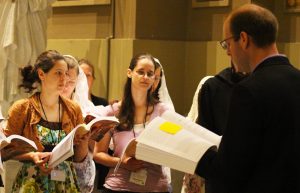When Catholic leaders consider the options for how to “pivot” into a post-Covid world, perhaps it would be a good idea to take a look at what is already working extremely well.
Consider the Church Music Association of America’s annual Colloquium, which is being held virtually this year. The Colloquium is overwhelmingly young. Young adults flock in annually for a rigorous, glorious week of Gregorian chant, sacred polyphony.

Consider the Chartres Pilgrimage, a 10,000 strong annual 3-day, 60-mile hike from Paris to Chartres, emphasizing the Extraordinary Form.
Colloquial evidence strongly indicates that in cities where parishes are being closed or consolidated due to a lack of parishioners, liturgically formal parishes are thriving. And while religious communities without a strong sense of liturgy are rapidly diminishing, those with a strong custom of common prayer are thriving.
Two recent articles have appeared to discuss this phenomenon among the young, both using the expression “Weird Christianity.” Both are worth a good read.
More and more young Christians, disillusioned by the political binaries, economic uncertainties and spiritual emptiness that have come to define modern America, are finding solace in a decidedly anti-modern vision of faith. As the coronavirus and the subsequent lockdowns throw the failures of the current social order into stark relief, old forms of religiosity offer a glimpse of the transcendent beyond the present.
Many of us call ourselves “Weird Christians,” albeit partly in jest. What we have in common is that we see a return to old-school forms of worship as a way of escaping from the crisis of modernity and the liberal-capitalist faith in individualism.
Weird Christians reject as overly accommodationist those churches, primarily mainline Protestant denominations like Episcopalianism and Lutheranism, that have watered down the stranger and more supernatural elements of the faith (like miracles, say, or the literal resurrection of Jesus Christ). But they reject, too, the fusion of ethnonationalism, unfettered capitalism and Republican Party politics that has come to define the modern white evangelical movement.
They are finding that ancient theology can better answer contemporary problems than any of the modern secular world’s solutions.
More here.
In print, the piece was titled “The Future Of Christianity Is Punk.”
***
Younger people are flocking to late-night Latin Mass — at least they were pre-COVID — and embracing Christian orthodoxy in online spaces.
So says Tara Isabella Burton, America-based author of the forthcoming book Strange Rites and a member of the self-proclaimed “Weird Christian” movement.
“The term is often applied to young, online Christians who embrace the elements of their faith that might be considered weird by the modern world,” Burton explains.
Elements, she says, like the death and resurrection of Jesus.
“We don’t have to explain away miracles or fit them into a modern scientific system, but actually embrace the strangeness of those ideas.”
The allure of Weird Christianity goes beyond an espousal of the Bible. Burton says the otherworldly nature of religious rituals are also appealing to the young and disillusioned.
“There’s a sense of enchantment that often comes with the pageantry,” says Burton, who attends St Ignatius of Antioch in New York City, part of the Episcopalian or Anglo-Catholic tradition.
More here.
***
Meanwhile, the greatest story ever told is now an app. The Chosen, a telling of the vocation stories in the Gospels in a way that is authentic, reverent, and decidedly hip, is universally available for viewing or free download on a pay-it-forward system.
The fields are white for the harvest! Will Church programming post-COVID be willing to minister to the widely expressed testimony of the longing of young souls for truth, beauty, and goodness?
